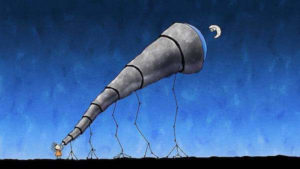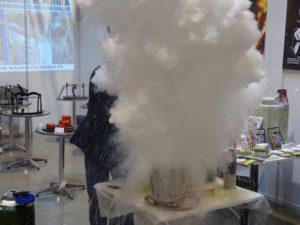Or: Why Stinky Cheese Helps
 Some science results in vital, society-altering work. Think about our creating vaccines, researching earthquakes, and discovering new construction materials.
Some science results in vital, society-altering work. Think about our creating vaccines, researching earthquakes, and discovering new construction materials.
Other science makes valuable contributions to our understanding of the universe around us—theoretical physics or marine biology, for example—and these very often produce society-altering work.
Then, of course, there is the science that doesn't quite have the same sort of impact, like magnetically levitating a frog or creating a chemical recipe to partially unboil an egg.
The Ig Nobel Prize is given out each September, around the time of the real Nobel prizes. It's broadcast every year on the Friday after Thanksgiving on NPR's program “Science Friday,” which makes for a much better use of my time than hunting Black Friday deals.
The awards either criticize (awarding a prize in “science education” to the Kansas State Board of Education for their stance on teaching evolution in schools) or to gently rib scientists for absurd research (testing the “five second rule” for eating food off the ground, which they proved to be false).
A few of my favorites:Discovering that the word “huh” or an equivalent seems to exist in every language.
 Realizing that if you attach a weighted stick to the rear end of a chicken, it then walks in the same way that dinosaurs were thought to have walked.
Realizing that if you attach a weighted stick to the rear end of a chicken, it then walks in the same way that dinosaurs were thought to have walked.- Measuring the friction between a banana skin and a shoe, and a banana skin and the floor, when we step on the banana.
- Investigating whether cat ownership is mentally hazardous (I could have answered that).
- Testing how reindeer react to seeing humans disguised as polar bears.
- Finding that some people could run on water, if that water were in the Moon's gravity instead of Earth's.
- Discovering the biochemical process by which onions make people cry.
- Figuring out that leaning to the left makes the Eiffel Tower seem smaller.
- Calculating the balance of physical forces inside a human ponytail
- Discovering a way to extract vanillin (the active component of vanilla) from cow dung.
All of my favorites are in the real-but-absurd science category: the awards given out to people doing homeopathy or predicting the end of the world are grin-worthy…but not all that interesting.
 The absurd science category sometimes becomes relevant: Sir Andre Geim won both the Ig Nobel Prize (he was the one to levitate the small frog with magnets) and the Nobel Prize for his work on graphene.
The absurd science category sometimes becomes relevant: Sir Andre Geim won both the Ig Nobel Prize (he was the one to levitate the small frog with magnets) and the Nobel Prize for his work on graphene.
And the Ig Nobel award-winning study showing that malaria mosquitoes are attracted to Limburger cheese has been used to create large-scale mosquito traps in strategic locations in Africa.
Mostly, though, I just find that the real science is funnier.
_________
Quotable
Yes, Yard Ramp Guy—I remain blog relevant. You?
“The most exciting phrase to hear in science, the one that heralds new discoveries, is not ‘Eureka!’ (I found it!) but ‘That's funny…’"
— Isaac Asimov